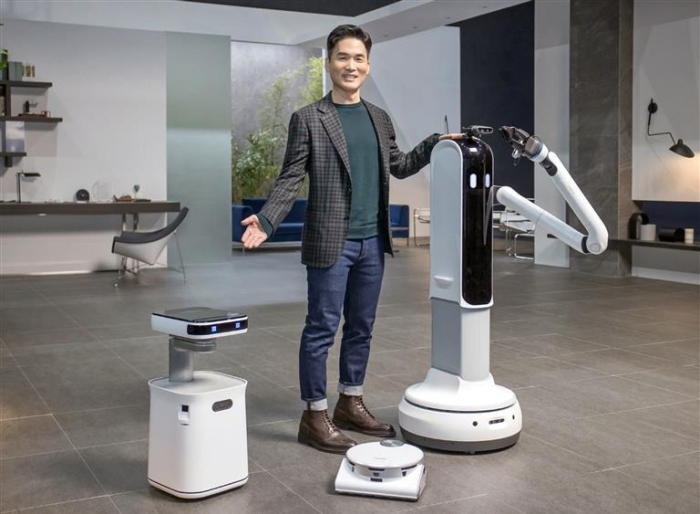Robotics
Robotics shares climb on the back of Samsung interest
Samsung Elec announced plans to create Robotics Business Team
By Dec 14, 2021 (Gmt+09:00)
4
Min read
Most Read
LG Chem to sell water filter business to Glenwood PE for $692 million


Kyobo Life poised to buy Japan’s SBI Group-owned savings bank


KT&G eyes overseas M&A after rejecting activist fund's offer


StockX in merger talks with Naver’s online reseller Kream


Mirae Asset to be named Korea Post’s core real estate fund operator



Investors are bullish on the industry after Samsung Electronics Co., Ltd. joined LG Electronics Inc. and Hyundai Motor Co. in eyeing the robotics industry. Some cautionary sentiments remain, however, as a sizable number of publicly traded robotics firms are in the red.
SAMSUNG ELECTRONICS LAUNCHES ROBOTICS BUSINESS TEAM
Yujin Robot Co. finished Monday’s trading 30% higher than the day prior at 4150 won ($3.51) per share. This is the first time in four months the share price of Korea’s first generation robotics company have hit above 4,000 won level.
Shares of actuator maker ROBOTIS and industrial robotics maker Hyulim ROBOT Co. Ltd. surged 30% and 26% respectively; and biped walking robot developer Rainbow Robotics stocks climbed 7%.
As part of the recent string of organizational restructuring, Samsung Electronics turned its experimental robot commercialization task force into a semi permanent robotics business team. The electronics corporation had created the task force under its home appliances division a year ago and sounded out its revenue potential, according to local media reports Monday.
Samsung’s de facto leader Jay Y. Lee had previously announced the company plans to invest some 240 trillion won into robotics, AI, system semiconductor, bio, and next generation communication technologies during the course of three years.
“It appears that Samsung Electronics will augment its investment in creating an ecosystem for robotics businesses,” said Noh Geun-chang, head of Hyundai Motor Securities research center. “As robots require system and memory semiconductors, the [new division’s] synergy effect with [Samsung Electronics’] existing businesses can be expected.”
Noh noted that compared to its competitors like LG Electronics, Samsung is a relative newcomer in this field. As such, he forecasts a possibility of Samsung Electronics expanding its foothold in the robotics business through mergers and acquisitions.

CHAEBOLS’ GROWING APPETITE FOR ROBOTICS
Samsung Electronics is not the only Korean conglomerate to take note of the largely untapped prospect for the automated machines industry.
Last December, Hyundai Motor Company acquired the US robotics firm Boston Dynamics Inc. from SoftBank Group for slightly less than 1 trillion won. LG Electronics, for its part, acquired a string of robotics companies; namely US based Bossa Nova Robotics in 2018, as well as four Korean companies including Acryl and SG ROBOTICS in previous years.
Texas based electric vehicle company Tesla announced plans for a humanoid robot dubbed Tesla Bot earlier this year. The bipedal bot is aimed at performing tasks that are unsafe, repetitive or boring to humans.
The bullish outlook on the robotics industry by major tech companies in Korea and beyond reflects the widespread investor sentiment that the market has entered a growth phase.
Market research firm Mordor Intelligence forecasts the global robotics market to grow from last year’s $27.7 billion to $74.1 billion by 2026.
Shin Sung-hwan, researcher at Shinhan Investment Corp., said “As low birthrate and aging population becomes the norm worldwide, countries around the globe must rely on robots for productivity.” He added, “The robotics industry will not only continue for a year or two but far into the future.”
Even the latest issue of supply bottleneck and wage hikes are positive signs for robotics stocks. “As companies are facing higher cost due to the continued disruption in supply chain and rising wages, demand for automation is rising,” Shin explained. The United States and China increasing investment into infrastructure is also good news for the robotics industry.
VOLATILITY IN THE SHORT TERM
Whether Korean robotics makers will reap tangible benefit vis-a-vis the Samsung organizational reshuffle is unclear.
Some critics say there is a slim chance the tech giant will outsource its productions to the domestic startups, which means limited gains for smaller builders.
Koh Tae-bong, head of research at Hi Investment & Securities Co.,Ltd., instead expects related industries such as cloud, 5G and battery could benefit in the mid- to long-term.
Most robot developers in the country are currently small to mid-sized companies with market capitalization of between 100 and 300 billion won. Also worth noting is that nearly all of them are in the red as of the third quarter of this year.
Those that are pessimistic of the Korean robotics startups recommend paying attention to the US ETFs focused on robotics. The Global X Robotics & Artificial Intelligence ETF (BOTZ,) for instance, has increased 9.14% this year; with the five-year return standing at a whopping 143.6%.
Write to Hyung-gyo Seo at seogyo@hankyung.com
Jee Abbey Lee edited this article
More to Read
-
 Business & PoliticsTrump Jr. meets Korean business chiefs in back-to-back sessions
Business & PoliticsTrump Jr. meets Korean business chiefs in back-to-back sessionsApr 30, 2025 (Gmt+09:00)
-
 Korean chipmakersSamsung in talks to supply customized HBM4 to Nvidia, Broadcom, Google
Korean chipmakersSamsung in talks to supply customized HBM4 to Nvidia, Broadcom, GoogleApr 30, 2025 (Gmt+09:00)
-
 EnergyLS Cable breaks ground on $681 mn underwater cable plant in Chesapeake
EnergyLS Cable breaks ground on $681 mn underwater cable plant in ChesapeakeApr 29, 2025 (Gmt+09:00)
-
 Business & PoliticsUS tariffs add risk premium to dollar assets: Maurice Obstfeld
Business & PoliticsUS tariffs add risk premium to dollar assets: Maurice ObstfeldApr 29, 2025 (Gmt+09:00)
-

Comment 0
LOG IN


